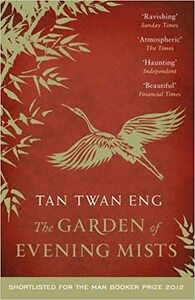Take a photo of a barcode or cover
challenging
mysterious
reflective
slow-paced
Plot or Character Driven:
A mix
Strong character development:
Yes
Loveable characters:
Complicated
Diverse cast of characters:
Yes
Flaws of characters a main focus:
Yes
An extraordinary novel, The Garden of Evening Mists. It surprised me with a lukewarm beginning that only revealed its story through impressions for the most part. All this seems at odds with the prose style, which I found choppy and staccato-like, even hard-boiled at times. Yet there was something dragging you along. Atmosphere? Yes. But more. Even from the beginning Tan Twan Eng entices you into an exploration of ideas and how they coincide and/or conflict with emotions. Two wars take place against the background, World War II and the Malayan Emergency. They are constantly there but seem to erupt only at certain points. Even the wartime Japanese camp and its tortures seems suppressed until . . . things explode.
So, what is this? A piece of historical fiction set against Malaya of the 1940s and 1950s and Malaysia of the 1980s. It is that. It's also a look at Malayan culture and civilization and competing parts, Malays, Chinese, Straits Chines, and Tamils. And remnants of European colonial administrators and businessmen.
One of the latter, Magnus, is a touchstone for the main character's, Yun Ling's, relationship to her country and her own spirit. And her dead sister. Into this mixture appears the face of the enemy Aritomo, once gardener to the Emperor of Japan, but who has lived in Malaya since 1940. Over an obsession with Japanese gardens and ways of looking at life, Yun Ling and Aritomo are brought together. Not merely romantically but ideally. Romance almost is given short shrift compared to the uncovering and discovery that is really taking place. The nature of the discovery itself is left for the reader to determine.
Clues abound, as they do within the storytelling. At one point, for example, Magnus introduces Yun Ling to a visiting American from Bangkok named Jim. He is working to restore the Thai silk industry and building a Thai house on a klong in Bangkok. For those unaware, this is Jim Thompson, the one time American spy who in fact did revitalize the Thai silk industry and who one day, while visiting Cameron Highlands in Malaysia, went for a walk and disappeared forever. "Jim" leaves the novel at this point but his disappearance and journey are interwoven into the fictional Aritomo's tale. The same with the story of the legendary Yamashita Gold and Operation Golden Lily. (For those who don't know, the legend is that General Yamashita, who masterminded the World War II invasion of British Malaya, was engaged in the large scale theft throughout all of Southeast Asia of gold, works or art, and rare gems. It was all taken to the Philippines, where it was supposed to be shipped to Japan. Stashes of Yamashita's gold and rare art are said to have remained in place across the region.) This story, like that of the two wars, works its way directly into the lives of everyone until at the end it must be put away forever.
This is an impressive work. So is the film adaptation, which, however, is not nearly as layered and mystifying as the novel.
So, what is this? A piece of historical fiction set against Malaya of the 1940s and 1950s and Malaysia of the 1980s. It is that. It's also a look at Malayan culture and civilization and competing parts, Malays, Chinese, Straits Chines, and Tamils. And remnants of European colonial administrators and businessmen.
One of the latter, Magnus, is a touchstone for the main character's, Yun Ling's, relationship to her country and her own spirit. And her dead sister. Into this mixture appears the face of the enemy Aritomo, once gardener to the Emperor of Japan, but who has lived in Malaya since 1940. Over an obsession with Japanese gardens and ways of looking at life, Yun Ling and Aritomo are brought together. Not merely romantically but ideally. Romance almost is given short shrift compared to the uncovering and discovery that is really taking place. The nature of the discovery itself is left for the reader to determine.
Clues abound, as they do within the storytelling. At one point, for example, Magnus introduces Yun Ling to a visiting American from Bangkok named Jim. He is working to restore the Thai silk industry and building a Thai house on a klong in Bangkok. For those unaware, this is Jim Thompson, the one time American spy who in fact did revitalize the Thai silk industry and who one day, while visiting Cameron Highlands in Malaysia, went for a walk and disappeared forever. "Jim" leaves the novel at this point but his disappearance and journey are interwoven into the fictional Aritomo's tale. The same with the story of the legendary Yamashita Gold and Operation Golden Lily. (For those who don't know, the legend is that General Yamashita, who masterminded the World War II invasion of British Malaya, was engaged in the large scale theft throughout all of Southeast Asia of gold, works or art, and rare gems. It was all taken to the Philippines, where it was supposed to be shipped to Japan. Stashes of Yamashita's gold and rare art are said to have remained in place across the region.) This story, like that of the two wars, works its way directly into the lives of everyone until at the end it must be put away forever.
This is an impressive work. So is the film adaptation, which, however, is not nearly as layered and mystifying as the novel.
dark
reflective
sad
slow-paced
Plot or Character Driven:
Character
Strong character development:
Yes
Loveable characters:
Complicated
dark
emotional
informative
inspiring
relaxing
medium-paced
Plot or Character Driven:
A mix
Strong character development:
Yes
Loveable characters:
Yes
Diverse cast of characters:
Yes
Flaws of characters a main focus:
Complicated
Graphic: War
Moderate: Torture, Violence, Xenophobia
Minor: Rape
emotional
reflective
sad
slow-paced
Plot or Character Driven:
Character
Strong character development:
Yes
Loveable characters:
Yes
Diverse cast of characters:
Yes
Flaws of characters a main focus:
Yes
Lots of character (mostly unlikeable) with only hints of story. I enjoyed how the book was written - in fact i thought the descriptions were quite beautiful. But the story actually never went anywhere!
dark
emotional
reflective
sad
medium-paced
Plot or Character Driven:
Character
Strong character development:
Yes
Loveable characters:
No
Diverse cast of characters:
Yes
Flaws of characters a main focus:
No
I don't know if the book is a real 5 star book for me, or if I feel the pressure to rate it as such. The writing is beautiful. I felt that I was there experiencing it all; the garden, the smells, the forest, the cave, the estates etc. It's interesting that Eng's main character, the narrator of the story, is a woman. Sometimes it seemed as if the book was competing with his first work and there were elements that were quite similar. Overall, in a few days I might think that it is really a five star book, but then again, I might not.....
As you can see (maybe) from my comments below, the book is five star writing but it wasn't amazing for me. I didn't really love it the way I did his first. It is difficult to say why I like or do not like certain books. I guess that I didn't really care too much about any of the characters. They weren't compelling.
As you can see (maybe) from my comments below, the book is five star writing but it wasn't amazing for me. I didn't really love it the way I did his first. It is difficult to say why I like or do not like certain books. I guess that I didn't really care too much about any of the characters. They weren't compelling.
I was disappointed. Meanders and gets a little overblown.




